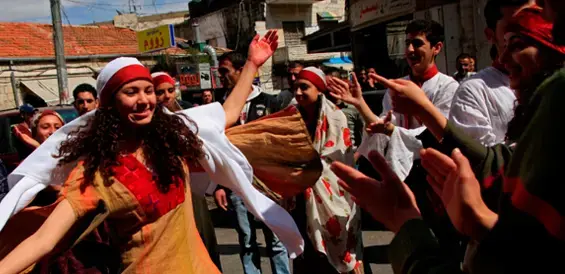Overview
According to the United Nations definitions of different groups of young people, 'adolescents' are those between 10 and 19 years old and 'youth' includes everybody between 15 and 24 years old.
More than 1.5 billion people in the world are between the ages of 10 and 25. This largest-ever generation of adolescents is approaching adulthood in a world their elders could not have imagined. UNFPA promotes and protects the rights of young people. It envisions a world in which girls and boys have optimal opportunities to develop their full potential, to freely express themselves and have their views respected, and to live free of poverty, discrimination and violence.
Youth in Palestine
Youth in Palestine comprise 30% of the population, of which 38.1% are adolescents aged 15-19 and 61.9% aged 20-29. The Palestinian society has been continuously described as a ‘young society’; nevertheless, Palestinian young people face many challenges affecting their economic, social and health wellbeing. Absence of conducive political, social and economic environment for youth and adolescents to become socially engaged increases the potential for high risk behaviours. Absence of a safe and healthy environment, malnutrition and lack of sport and exercise, and widely spread addictive behaviours such as smoking, alcohol and drugs increase youth feeling of dispersion and, hence, tendency to migration. These problems are worsened by the lack of knowledge and information and services tailored for adolescents and youth. The prevailing medical conception on youth as a healthy population has resulted in neglect to provide important health services leading to unfavourable social, emotional and psychosocial consequences. Also, programmes geared toward addressing youth issues do not engage and empower youth by fulfilling their rights to participate meaningfully in decision-making affecting their well-being. The high youth concern in Palestine is unemployment which reached 30% according to the national youth survey, with the highest rate among females aged 18-24 reaching 60%.
Adolescent girls are exposed to the risk of early marriage, particularly in rural and vulnerable areas. In 2014, 22 per cent of reported married women aged 20 to 24 had married before age 18, with 22 per cent giving birth to a live child before 18, exposing them to complications of teenage pregnancy and affecting their likelihood to complete higher education and, consequently, preventing girls from attaining their full physical, social and emotional potential.
(Sources: National Youth Survey, PCBS, 2015. MICS Survey, PCBS, UNICEF, UNFPA, 2014)
UNFPA's interventions
UNFPA has been advocating for comprehensive sexuality education; it has successfully supported Ministry of Education and Higher Education to incorporate SRH in the school curriculum for the 7th, 8th, 9th and 10th grades. UNFPA has managed to put the Youth Friendly Health Services (YFHS) on the agenda of the MoH, who agreed to adopt YFHS standards and package in line with WHO standards. In 2014, MoH with support from UNFPA started to offer YFHS in one centre in the West Bank aiming at replicating such model in other locations. Peer to peer approach was advanced through strengthening peer to peer educators in and outside of schools to deliver messages to their peers on life-skills, GBV, HIV prevention and healthy lifestyles. UNFPA promoted Palestinian youth leadership and civic engagement within the community by supporting community initiatives led by youth and networking them with CBOs and NGOs.
Making adolescents and youth a priority
Young people are too often excluded by decision-makers – to the detriment of youth themselves and future generations.
To empower young people and to enable them to become drivers of change, UNFPA aims to:
- Understand the conditions facing vulnerable, marginalized adolescents, using data from censuses, demographic and health surveys, and other sources;
- Bring together governments, civil society, donors, the private sector and youth-led organizations to advocate for more investment in young people as a development priority;
- Build the skills of young leaders and involve young people and youth-led organizations in policymaking and programming;
- Support independent, effective and sustainable organizations led by young people, especially marginalized adolescents, to advocate for their human rights and development priorities.
Y-Peer
Y-Peer, the Youth Peer Education Network, is a groundbreaking and comprehensive youth-to-youth initiative, supported by UNFPA, consisting of more than 500 non-profit organizations and governmental institutions. Its membership includes thousands of young people working in many areas, including those involving adolescent sexual and reproductive health.
UNFPA has established the Y-Peer network in Palestine in 2013, to promote a healthy life style among youth through peer to peer approach, and to build partnerships between young people and adults by advocating for policies and services, such as: increased access to information, knowledge, and services on sexual and reproductive health.


